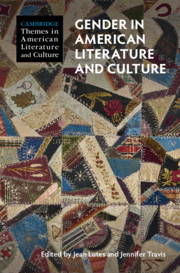Book contents
- Gender in American Literature and Culture
- Cambridge Themes in American Literature and Culture
- Gender in American Literature and Culture
- Copyright page
- Contents
- Contributors
- Acknowledgments
- Introduction
- Part I Intimacies
- Part II Aggressions
- Part III New Directions
- Chapter 15 What a Doctor Should Look Like
- Chapter 16 Genderqueer
- Chapter 17 Fanfiction, Transformative Works, and Feminist Resistance in Digital Culture
- Chapter 18 Vulnerable States
- Chapter 19 The Mahjar
- Chapter 20 Disabled Women’s Life Writing and the Problem with Recovery
- Chapter 21 Feeling, Memory, and Peoplehood in Contemporary Native Women’s Poetry
- Bibliography
- Index
Chapter 20 - Disabled Women’s Life Writing and the Problem with Recovery
from Part III - New Directions
Published online by Cambridge University Press: 01 April 2021
- Gender in American Literature and Culture
- Cambridge Themes in American Literature and Culture
- Gender in American Literature and Culture
- Copyright page
- Contents
- Contributors
- Acknowledgments
- Introduction
- Part I Intimacies
- Part II Aggressions
- Part III New Directions
- Chapter 15 What a Doctor Should Look Like
- Chapter 16 Genderqueer
- Chapter 17 Fanfiction, Transformative Works, and Feminist Resistance in Digital Culture
- Chapter 18 Vulnerable States
- Chapter 19 The Mahjar
- Chapter 20 Disabled Women’s Life Writing and the Problem with Recovery
- Chapter 21 Feeling, Memory, and Peoplehood in Contemporary Native Women’s Poetry
- Bibliography
- Index
Summary
This chapter explores how feminist criticism’s valorization of agency has at times erased disabled women’s accounts of bodily and mental pain. While praised in feminist circles, the concept of recovery, in particular, exists in tension with disability studies’ refusal of narratives that privilege ability. In framing this interrogation of recovery as a crip feminist practice, I turn to disabled women’s life writing, which charts how recovery’s normalizing impulse threatens to either misrepresent or overlook women’s impairments. Charlotte Perkins Gilman’s “The Yellow Wall-Paper” (1892), Audre Lorde’s The Cancer Journals (1980), Anne Finger’s “Helen and Frida,” and Leslie Jamison’s The Recovering (2018) redefine recovery as living with and alongside disability rather than in spite of it.
- Type
- Chapter
- Information
- Gender in American Literature and Culture , pp. 316 - 331Publisher: Cambridge University PressPrint publication year: 2021

